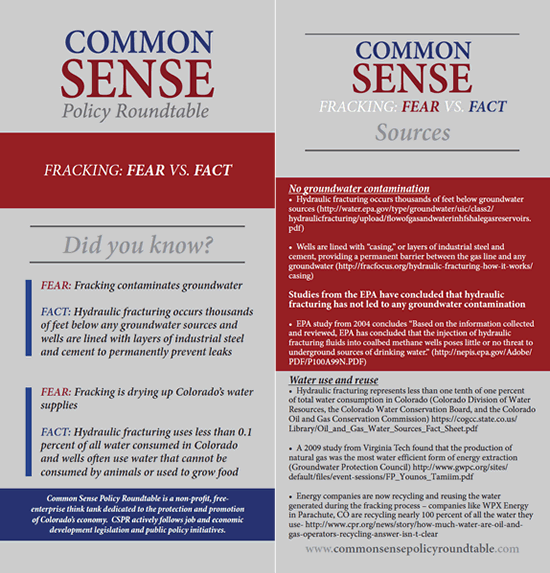Introduction
Did you know?
FEAR: Fracking contaminates groundwater
FACT: Hydraulic fracturing occurs thousands of feet below any groundwater sources and wells are lined with layers of industrial steel and cement to permanently prevent leaks
FEAR: Fracking is drying up Colorado’s water supplies
FACT: Hydraulic fracturing uses less than 0.1 percent of all water consumed in Colorado and wells often use water that cannot be consumed by animals or used to grow food
FEAR: Fracking is making pollution worse
FACT: Natural gas is a far cleaner fuel source than other fossil fuels and as more of the natural gas generated from hydraulic fracturing is used, carbon emissions will decrease
FEAR: Fracking is a new technology that we don’t understand
FACT: Hydraulic fracturing has been used since the 1940s and many energy industry experts have spent decades safely working with hydraulic fracturing

Sources
No groundwater contamination
Studies from the EPA have concluded that hydraulic fracturing has not led to any groundwater contamination
- EPA study from 2004 concludes “Based on the information collected and reviewed, EPA has concluded that the injection of hydraulic fracturing fluids into coalbed methane wells poses little or no threat to underground sources of drinking water.” (http://nepis.epa.gov/Adobe/PDF/P100A99N.PDF)
Water use and reuse
- Hydraulic fracturing represents less than one tenth of one percent of total water consumption in Colorado (Colorado Division of Water Resources, the Colorado Water Conservation Board, and the Colorado Oil and Gas Conservation Commission) https://cogcc.state.co.us/Library/Oil_and_Gas_Water_Sources_Fact_Sheet.pdf
- A 2009 study from Virginia Tech found that the production of natural gas was the most water efficient form of energy extraction (Groundwater Protection Council) http://www.gwpc.org/sites/default/files/event-sessions/FP_Younos_Tamiim.pdf
- Energy companies are now recycling and reusing the water generated during the fracking process – companies like WPX Energy in Parachute, CO are recycling nearly 100 percent of all the water they use- http://www.cpr.org/news/story/how-much-water-are-oil-andgas-operators-recycling-answer-isn-t-clear
Lower Emissions and Less Pollution:
Proven Technology and Proven Results:
The information above is a combination of two Common Sense Policy Roundtable publications. Both pamphlets can be downloaded below:
>> Download pamphlet 1 - pdf
>> Download pamphlet 2 - pdf